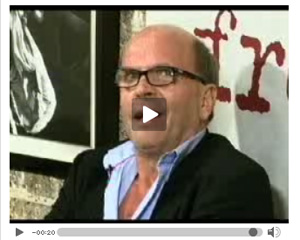At the end of the academic year John Mair, senior lecturer in broadcasting at Coventry University, asked just what would happen to his undergraduate journalism class of 2009. In the face of the biggest media recession for many a generation where do they go? Is there life after a journalism course? A few months on, we are re-visiting the students.
Greg Keane graduated with a 2.1 in journalism and media from Coventry University last June. He has turned a specialist interest into a small niche in journalism, non-league football.
It’s pointless to send away your CV in pursuit of that first job without any kind of meaningful credential except a degree in journalism.
Despite being warned on countless occasions that work will not simply come to you on the back of a university course, I arrogantly – as I am sure is the case for many of my peers – did not take much heed of the advice.
I applied for trainee jobs advertised on sites such as this one, thinking – almost without doubt – that my 2:1 in journalism and media earned in June this year was easily enough to merit me at least an interview.
Thankfully, reality set in soon enough after early knock-backs. I realised that only with proactivity would I make a name for myself.
An article in which I described my home town football club Luton Town as ‘the most exciting club in England’ generated a large amount of debate across many football forums, as fans struggled to work out whether the title was a question, or in fact a statement.
I had sent the article to the presenter of BBC London’s Non-League Football Show and pitched an idea to her about regularly updating fans on the Hatters’ often turbulent existence throughout the upcoming football league (or non-league as is the case) campaign.
She loved the idea and published the article although I was inaccurately described as ‘a Luton Town fan blogger’ (a description which is wrong on two counts: I was/am neither a blogger of Luton Town, nor a fan! Like many sports writers, I too won’t disclose the identity of the club I support. It isn’t one of the big four by the way).
The piece got significant interest and found its way being discussed on a number of football forums and I even received praise from Luton Town chairman and BBC Midlands Today presenter Nick Owen, via email.
I now regularity contribute features for the BBC London pages on a variety of non-league sides, for example. (Examples of my work here).
After this, I was asked to produce features for the site www.nonleaguefootballlive.com on a freelance basis. This has provided a tremendous platform on which to make a name for myself in a community which may be large, but lacking in many alternative avenues of information and reports from their clubs.
I have since become ‘chief reporter’ for the site and my articles stimulate much debate on the site’s own lively forum as well as clubs’ own message boards.
An article I wrote documenting the plight of Wrexham FC and their supporters seemed also to strike a chord with the Guardian’s David Conn who praised my article – recently he wrote a piece highlighting the trouble Wrexham supporters had trying to protect their ground.
Non League Football Live also has plans to launch a magazine in the coming weeks which they have asked me to play a big part in it.
But I haven’t confined myself to reporting: I have taken up a role as press secretary for the famous Corinthian Casuals in South London/Surrey and that position guarantees that my reports get published in around 14 ‘thisislocallondon’ newspapers and their online sites and one national, the Non-League Paper, which comes out every Sunday across the UK. Casuals are a club steeped with history so there is plenty of scope there to carve out a story.
And radio too: after a couple months of one day a week work experience at Mercia Radio in Coventry, my efforts paid off when they signed a deal to commentate on Coventry City matches.
I now do some paid assistant producing on the Tom Ross ‘Goalzone’ show. I control the studio and the commentator throughout a 3-4 hour show.
It is frantic work but it is enjoyable and certainly gets the adrenaline running. I also provide Mercia with a regular Sky Blues blog – another home for my work.
Unexpectedly, I foresee my future in sports reporting now, especially after finding a niche for myself in non-league football. It may not be glamorous or particularly exciting for many, but I enjoy it and hope that in the not too distant future, there will be a permanent job offer.
